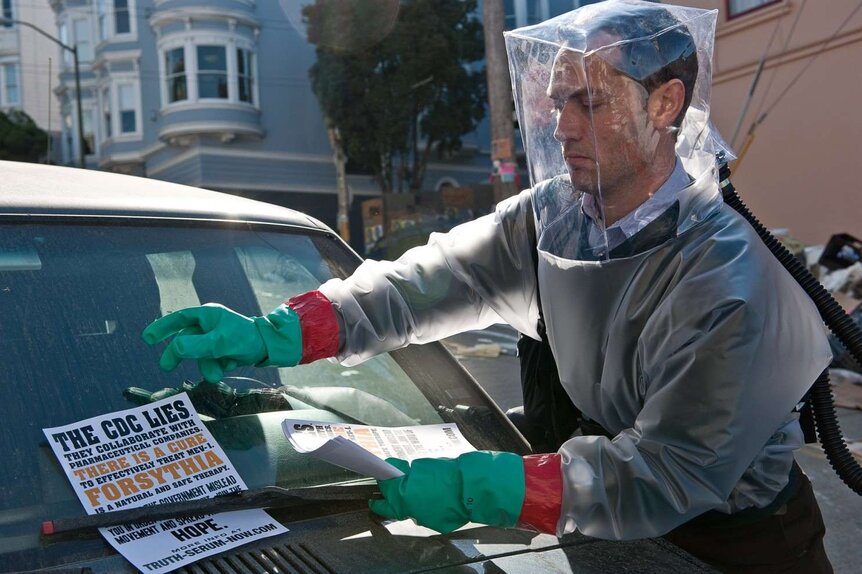Create a free profile to get unlimited access to exclusive videos, sweepstakes, and more!
This Week in Genre History: Contagion accidentally predicted our pandemic future

Welcome to This Week in Genre History, where Tim Grierson and Will Leitch, the hosts of the Grierson & Leitch podcast, take turns looking back at the world’s greatest, craziest, most infamous genre movies on the week that they were first released.
One by-product of living in a time of constant tumult and oft-apocalyptic rhetoric and fervor is how often life in this particular era makes people say things like, “This feels like a movie!” You heard it constantly after 9/11, and even the theater of war has the patina of cinema: “Realism” becomes, in many ways, more real than reality.
So it is perhaps inevitable that Contagion, Steven Soderbergh’s nightmare pandemic thriller that came out Sept. 9, 2011, would hit so hard today. At the start of the coronavirus pandemic, the film was one of the most-rented movies on iTunes and Amazon, and once it became available to stream on HBO Max, it instantly became one of the service's most popular films. In 2020, the world of Soderbergh’s film began to feel virtually indistinguishable from our own.
Contagion had terminology that we glossed over in 2011 but has entered our regular lexicon today: “social distancing,” “treatment protocol,” “CDC recommendations.” This makes the film feel ahead of its time, somehow futuristic, even though it didn’t so much look forward as try to understand how, in that current moment of 2011, the world would handle such a pandemic. The movie didn’t see anything coming; it just anticipated something that, frankly, we should have already been anticipating anyway.
The problem is not that Contagion predicted the future; the problem is that Contagion conjured up our worst fears... and then, over time, we forgot about those fears. Now the movie has returned to our consciousness. And it turns out it was right all along.
Why was it a big deal at the time? Screenwriter Scott Z. Burns, who had worked with Soderbergh on The Informant! (and, later, Side Effects and The Laundromat), had always wanted to do a movie about a pandemic, specifically to make something that “really felt like what could happen.” (When he sent Matt Damon the script, he told him, “Read this, then wash your hands.” Damon admitted later he did exactly that.)
For a film that is hardly some sort of audience pleaser, the film was actually a bit of a mainstream nod for Soderbergh. It had been four years since he’d made the third and final film in the Ocean’s trilogy (Ocean's Thirteen), and he’d actually had a string of flops and minor releases, from Solaris to Bubble to The Girlfriend Experience to The Good German. A lot of those movies are good, but they certainly weren’t hits, and Soderbergh was also reportedly worn down after the Herculean effort he put in making the two Che films. In many ways, Contagion was meant as a commercial enterprise: a thriller, with a ton of movie stars. That’s a very Soderbergh thing: His “mainstream” movie would be a massive risk for anyone else.
What was the impact? The movie was a hit, winning its opening weekend and ultimately making $75 million at the domestic box office. (It is in fact the fourth biggest non-Ocean's film of his career, behind Erin Brockovich, Traffic, and Magic Mike.) The movie received good reviews, too. But what’s sort of remarkable about it is that while people found the movie scary, they didn’t find it particularly revelatory. There was no spate of feature stories about how Contagion portends a terrifying future, or how it shone a light on how unprepared Americans were for a potential pandemic. It was thought of as “realistic,” but not, you know, “real.” It certainly did not spur anyone into action.
If anything, it was seen as a feat of engineering by Soderbergh, one of his mainstream “experiments” that paid off. The movie, perhaps because of Soderbergh’s trademark remoteness, doesn’t feel particularly impassioned; there’s no “call your congressperson” note at the end. It’s just a straightforward look at what might happen in a pandemic. That it felt fanciful then, and not now, is not the movie’s fault: It’s ours.
Has it held up? Burns made a big deal of noting that he wasn’t just trying to write about how Americans would handle a pandemic: He was writing about how they would handle it at that particular moment, in 2011. One painful quote from the time to look at today: “Well, do you close the schools? And if you close the schools, then who stays home with the kids? And will everyone keep their kids at home?” (He didn’t know the half of it.) But this also manifests itself in a “blogger” character played by Jude Law. Burns was trying to use Law’s character to show how “some people will write things about anti-virals or different treatment protocols,” and how information could spread out of control online. In 2011, you would dramatize this by having a blogger character. In 2020, you just need to look at your uncle’s Facebook page.
That’s why Law’s character is the one part that doesn’t hold up in 2020: The people are the same, but the technology, and the messaging, has shifted. Watching the film now, all of it rings true, painfully true, except for Law’s character. But there is no comfort in that. If anything, his derided blogger character is, in fact, a trusted gatekeeper in the film: Believe him or not, but you at least can track where he’s coming from. Now the information isn’t just faulty, it’s coming from inside the house — both your own and the White.
Everything else in Contagion is as scary as it is today. But the way we share information... that’s actually scarier now. Contagion at the time felt like horrific future fiction. Watching it now... there are somehow sections where you find yourself nostalgic.
Which might be the most terrifying aspect of all.
Will Leitch is the co-host of The Grierson & Leitch Podcast, where he and Tim Grierson review films old and new. Follow them on Twitter or visit their site.



























